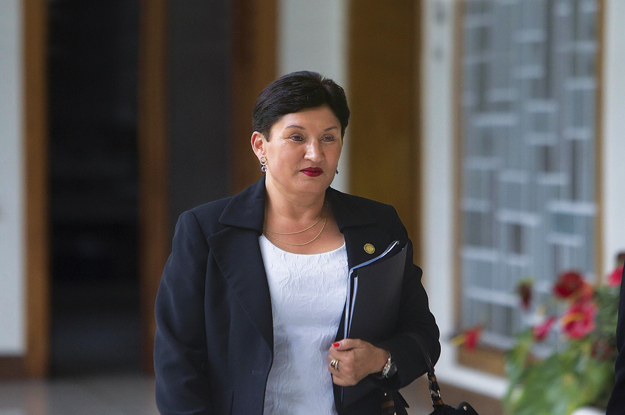This article is adapted from our 1st print issue of 2016. For an overview of our Top 5 Corruption Busters, click here.
From the moment Thelma Aldana was named Guatemala’s attorney general in 2014, she was underestimated. The Economist said she was “likely to take the judicial system in a … new and potentially backward direction.” A prominent Guatemalan historian, writing in The New York Times, called her appointment “a slap in the face to reformers.”
The tone began to change somewhat in 2015, when she helped lead an investigation that resulted in the resignation and imprisonment of Guatemala’s president. But even now, Aldana’s role tends to be downplayed by those who say a United Nations–sponsored body, known as CICIG, did most of the critical detective work.
That’s too bad, because in reality Aldana did remarkable work rallying Guatemalan society, including her fellow prosecutors, behind the belief that a new era has dawned. Serene and understated in manner, but refreshingly direct in her language, she articulates the need for a crackdown on graft as well as anyone in Latin America. “Corruption had become part of our culture,” she told AQ. “But it’s not normal for a president or vice president to be corrupt. Young people understood this. But we had to convince other segments of society.”
“I think we accomplished that. And I dare say this is a cultural change that’s here to stay.”
To ensure that’s the case, Aldana has fought for greater funding for Guatemala’s public ministry, its main investigative body. She said the agency’s budget was cut in recent years by the very same politicians who allowed CICIG to continue operating. “They decided to do one thing well, and one thing badly,” she said with a coy smile. “They thought they could look good politically, but control the internal part themselves.”
“Clever, eh? But it didn’t work.”
Her willingness to so openly hold politicians accountable may explain why she was initially greeted with such skepticism. She has also said she is on the right wing politically. This led to concern that she might derail the work of her predecessor, Claudia Paz y Paz, who pursued human rights cases related to Guatemala’s 1960–1996 civil war.
Aldana said that, upon becoming attorney general, she told prosecutors working on those cases to “pretend nothing changed,” and proceed as they did under Paz y Paz. In fact, she allocated more resources to the team of prosecutors looking into sexual crimes during Guatemala’s dictatorship, an issue she said has not received as much media attention but is tremendously important.
“Women were the main victims of our armed conflict,” Aldana said. “But this remains a patriarchal culture, so it hasn’t gotten as much attention.” She said that, thanks to ongoing investigations, “now, soldiers know that if, God forbid, there is another conflict, and they rape women, justice will respond.”
—
Winter is the editor-in-chief of Americas Quarterly.






